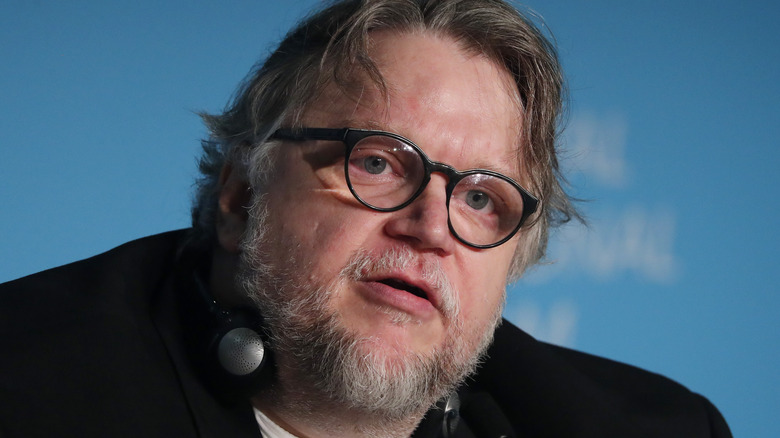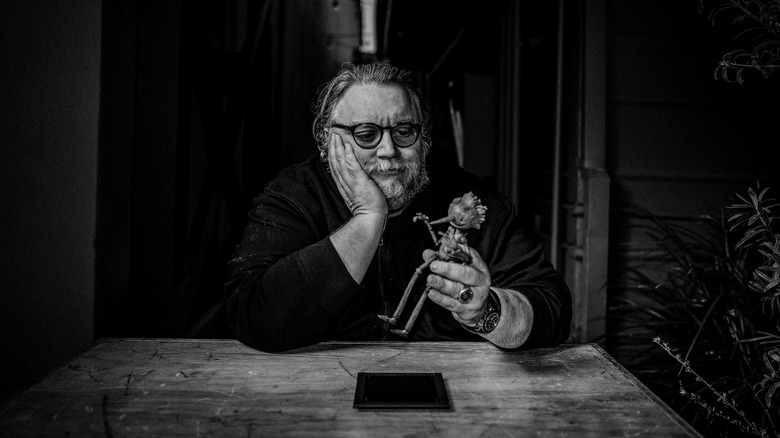Guillermo Del Toro Makes A Keen Observation About The Film Industry
In addition to all the sickness and loss of life, the COVID-19 pandemic has also wreaked havoc on businesses worldwide in the past couple of years, taking a particularly heavy toll on the film industry. According to the Los Angeles Times, nearly 5,500 theaters were forced to shut their doors — some temporarily, others permanently — in 2020 alone as the U.S. went into lockdown. The recovery since then has been gradual, with signs of a return to normalcy coming in late 2021 and most of 2022 thanks to the blockbuster successes of "Spider-Man: No Way Home," "The Batman," and more recently, "Doctor Strange in the Multiverse of Madness."
However, the already burgeoning medium of streaming became a staple in many U.S. households during the pandemic, signaling a cultural shift in the way audiences view their entertainment. That, of course, is good news for those who make content for the streaming medium, but it spells uncertainty for others who've almost exclusively have created films for the big screen, including Oscar-winning director-producer Guillermo del Toro. Speaking during a press conference at the 2022 Cannes film festival (via IndieWire), del Toro tried to make sense of the changes in film presentation since the pandemic and questioned if the state of the film business is still sustainable as a result.
Film has undergone a 'profound' change during the pandemic, del Toro says
Del Toro's first big film in Hollywood came in 2004 — comic book anti-hero movie "Hellboy" — and he proved his success wasn't a fluke in 2006 with the creature fantasy "Pan's Labyrinth," which earned the filmmaker Oscar nominations for Best Foreign Language Film and Best Original Screenplay. In 2018, del Toro was rewarded with his biggest honors to date — a pair of Oscars for directing and producing his "Creature from the Black Lagoon"-inspired fantasy "The Shape of Water."
While it's been a mere five years since "The Shape of Water" opened on the big screen, the floodgates have burst wide open — thanks to the pandemic — for streaming and the way films are viewed, whether it be on TVs, laptops, or cell phones. During the Cannes press conference, IndieWire reported, del Toro equated the changes the industry is facing now to what happened just under a century ago when talkies made silent movies obsolete.
"There are many answers to what the future is. The one I know is not what we have right now. It is not sustainable. In so many ways, what we have belongs to an older structure," del Toro observed. "That's how profound the change is. We are finding that it is more than the delivery system that is changing. It's the relationship to the audience that is shifting. Do we hold it, or do we seek and be adventurous?"
Adapting to the streaming medium
While del Toro's most recent film, the 2021 noir thriller "Nightmare Alley," opened exclusively in theaters and went on to secure the filmmaker another Best Picture Oscar nomination, he is clearly open to working within the streaming medium. His next film, however — a stop-motion animated feature version of "Pinocchio" — is being produced exclusively for Netflix after studios said no to del Toro's take on the classic fairy tale, according to IndieWire.
The switch to streaming — no matter how temporary it may be — has del Toro pondering if film should be restricted to a certain kind of presentation, the publication reported.
"We have to question ourselves. Are we arguing about the size of the screen or the size of the ideas?" del Toro asked during the Cannes press conference. "Are we arguing that cinema can only exist as certain footage, or is it something that holds us with visuals and music and sounds and transports us to a place no other art can?"


